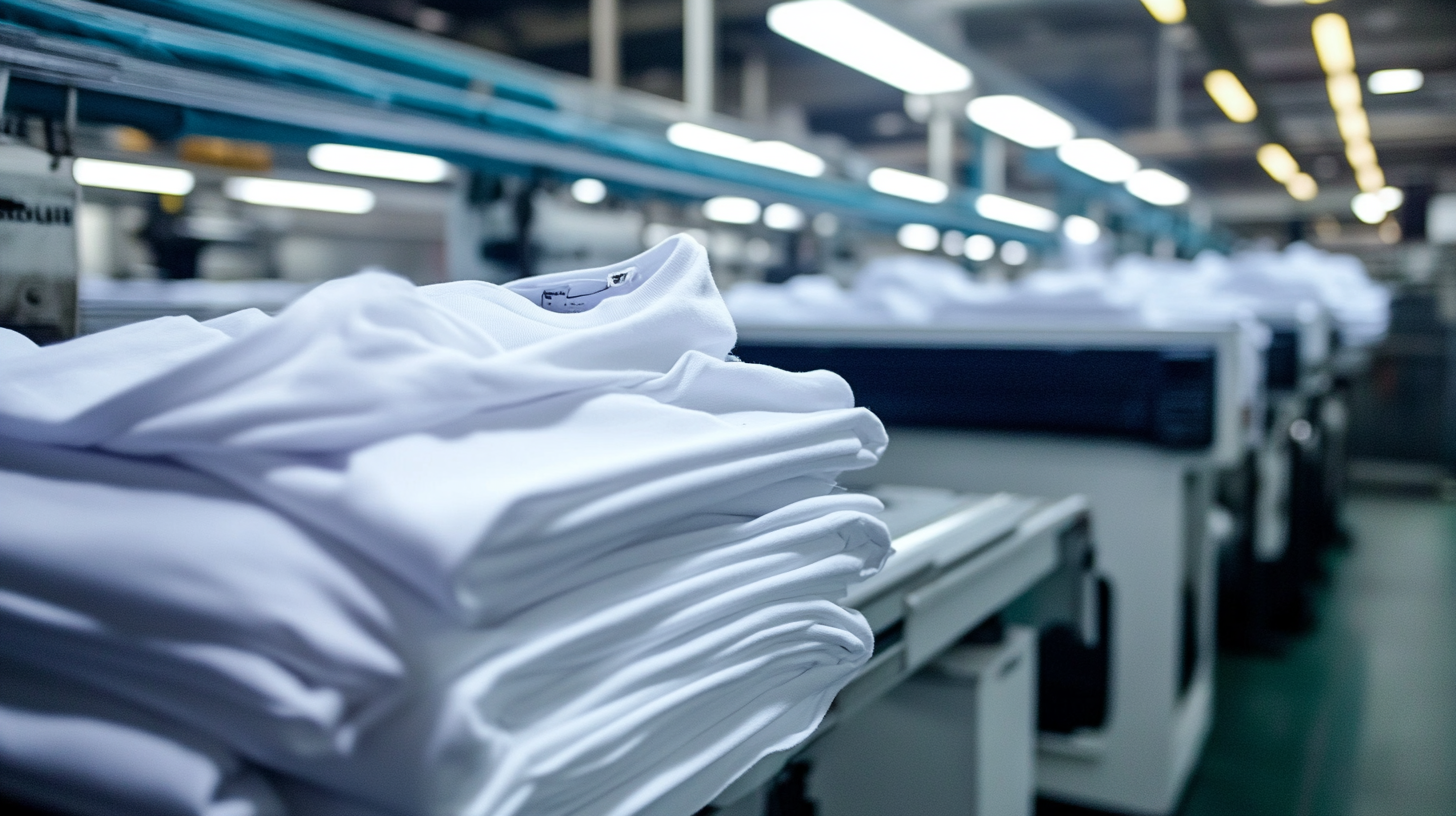Leave Your Message
In the dynamic landscape of fashion and apparel, understanding industry production standards is crucial for achieving excellence in T Shirt Manufacturing. The global T-shirt market was valued at approximately $3.64 billion in 2020 and is projected to reach $5.56 billion by 2026, reflecting the rising demand for customized and sustainably produced garments. However, with this growth comes the challenge of adhering to consistent quality and sustainability benchmarks, which can significantly influence consumer satisfaction and brand loyalty. Reports indicate that 70% of consumers are willing to pay more for sustainably produced clothing, highlighting the need for manufacturers to align their operations with industry standards that prioritize not only quality but also environmental responsibility. By integrating these best practices into T Shirt Manufacturing processes, companies can enhance their competitive edge while contributing to a more sustainable future in fashion.

In the ever-evolving world of fashion, industry production standards play a crucial role in ensuring the quality and sustainability of t-shirt manufacturing. These standards set benchmarks for material selection, labor practices, and environmental impacts, guiding manufacturers toward more responsible production processes. By adhering to established standards, companies can enhance product quality while minimizing waste and promoting ethical labor practices, which ultimately benefits both consumers and the environment.
Moreover, industry production standards foster transparency and trust within the supply chain. When manufacturers commit to high standards, it instills confidence among consumers who are increasingly concerned about the origins of their clothing. This transparency not only enhances brand reputation but also encourages a culture of accountability across the industry. As more brands recognize the importance of aligning their practices with industry standards, they contribute to a collective movement towards more sustainable and ethical production. This shift not only meets consumer demand for responsible fashion but also paves the way for innovation and improved practices in t-shirt manufacturing.
Establishing effective production standards is crucial for T-shirt manufacturers aiming to deliver high-quality products consistently. Key components of these standards include material selection, production processes, and quality control measures. By ensuring that raw materials, such as cotton, meet specific criteria, manufacturers can produce T-shirts that not only feel good but also last long. Additionally, maintaining rigorous production processes ensures that each step, from spinning to dyeing, adheres to industry benchmarks, minimizing defects and waste.

Another important aspect is the breakdown of production costs. Understanding the average cost per unit, which hovers around $2.42 for cotton T-shirts, enables manufacturers to set competitive pricing while maximizing profit margins. Analyzing cost structures helps identify areas for improvement and efficiency, which can lead to enhanced productivity. Moreover, aligning production standards with consumer trends is essential. As the fashion industry evolves, brands must adapt quickly to shifts in customer preferences and values, emphasizing sustainability and ethical practices to stay relevant in a rapidly changing market.
In the realm of t-shirt manufacturing, understanding and adhering to industry production standards can significantly influence a brand's success. Case studies of prominent t-shirt brands reveal the importance of efficient production practices and quality control. For example, a report by Grand View Research highlights that the global t-shirt market is expected to reach $202 billion by 2026, primarily driven by consumer demand for high-quality and sustainably produced apparel. Brands like Patagonia set a benchmark with their commitment to utilizing organic materials and transparent supply chains, illustrating that production standards can resonate strongly with eco-conscious consumers.

Another case in point is Bella+Canvas, which prioritizes ethically-made products. According to a study by the Fashion Institute of Technology, companies that invest in sustainable production practices often see a 15% increase in brand loyalty among millennial consumers. They utilize cutting-edge technology that minimizes waste and energy usage during the manufacturing process, showcasing the link between sustainable practices and consumer satisfaction. By examining these successful brands and their adherence to production standards, emerging t-shirt labels can glean invaluable insights that may enhance their operations and market positioning.
Adhering to production standards in the apparel industry is fraught with challenges that can significantly impact quality and efficiency. According to a 2021 report by the Apparel Research Institute, over 40% of manufacturers struggle to meet sustainability benchmarks, which are increasingly important due to consumer demands for ethically produced goods. These challenges are compounded by varying regulations across different regions, leading to confusion and compliance issues that can hinder manufacturing processes.
Moreover, technology plays a crucial role in maintaining production standards. A study by the Global Apparel Federation revealed that 60% of production delays are attributed to outdated machinery and insufficient training in the latest manufacturing practices. This gap not only affects the consistency of product quality but also increases operational costs. As brands strive to enhance their production standards, investing in modern technology and training programs becomes essential to navigate these challenges effectively. By addressing these issues, manufacturers can enhance their adherence to production standards, ultimately leading to better quality apparel and improved market competitiveness.
As the T-shirt manufacturing industry evolves, sustainability is emerging as a crucial standard that brands must adopt to remain competitive and responsible. Future trends indicate a shift towards eco-friendly materials and production processes that minimize environmental impact. Brands are increasingly investing in organic cotton, recycled polyester, and innovative fabrics like Tencel, which not only cater to eco-conscious consumers but also reduce the carbon footprint.
Tips for implementing sustainable practices in T-shirt manufacturing include sourcing materials from certified suppliers and focusing on local production to cut down transportation emissions. Brands can also explore the use of digital printing technologies, which often consume less water and energy compared to traditional methods. Moreover, engaging customers in sustainability initiatives, such as recycling programs or awareness campaigns, can further enhance a brand's reputation and promote responsible consumption.
As sustainability becomes a key production standard, brands must stay ahead of trends by regularly updating their practices and materials. Collaborating with environmental organizations can help brands ensure their processes align with best practices while also informing them about the latest regulations and certifications in the industry. By prioritizing sustainability, T-shirt manufacturers can not only meet customer expectations but also contribute positively to the planet.
